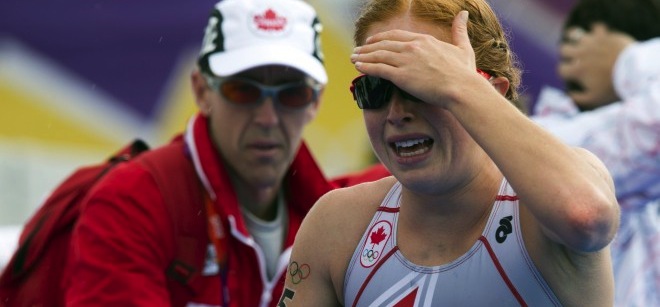Canadian triathlete Paula Findlay’s long and lonely run to last place
‘I was thinking about all my friends back home…and my family here.’
Share
Paula Findlay approached the Olympic triathlon finish in 52nd and last place Saturday, running and crying, and crying and running. She wanted to quit so badly, to walk off the course, away from this mess of a race that began and ended in London’s Hyde Park, that tranquil oasis in the midst of a frenetic city.
She wanted to quit, and she didn’t want to quit, dammit, because she’s Paula Findlay, 23, from Edmonton, and she’s a triathlete: a one-time world champion, tough as the soles of her pink Nike runners; a ferocious competitor, all 121 pounds of her.
So, she cried and she ran, alone now on the course with her thoughts. She glanced up into the stands. Her family was there somewhere; come all the way to see her run in her first Olympics. This mess of a race where she crossed the line 12:21 behind the thrilling photofinish that saw Nicola Spirig of Switzerland edge Lisa Norden of Sweden by a margin as thin as British coffee.
“I was thinking about all my friends back home who stayed up until 2 o’clock in the morning to watch me, and my friends along the course—and my family here.”
She’s talking now to a pack of Canadian reporters, just a few minutes after the finish. She stood there for a minute, drying her tears, as we waited in uncomfortable silence. Really, what do you say? What do you ask, when all you want to do is let her go to find her family so they can cry together?
But we all have jobs to do. She gave a smile and a shrug and said: “So?”
And I gave a smile and a shrug and asked why she had decided to finish running when all was lost?
“I was so tempted to pull out even on the bike,” she said. “I had nothing in my legs, and I don’t know why. I did everything I could to prepare and I felt so good leading up to this. I’ve had some really good training. I really thought I could do something cool today.”
She knew she was in trouble as soon as she emerged from the swim in Hyde Park’s Serpentine Lake and climbed on her bike. The legs that have carried her so far weren’t there for her today. They were dead, they were weak, they were failing her, and that was an awful feeling. Elsewhere on the course, her Canadian teammate Kathy Tremblay had even worse luck on the bike. She was caught in a crash and her race ended there and then. Findlay got off the bike, hopelessly behind. She was dizzy and her legs were dead. “I couldn’t move them,” she said. “Stupid legs.”
She told the Canadian team doctor that she probably couldn’t finish. He said she’d feel better about herself if she kept going. So she did, and, yes, she does feel better. Or, slightly less awful.
She has been running Olympic distance triathlon training for just two months, after a slow recovery from a labrel tear in her right hip. But, she said afterwards, the hip wasn’t the problem.” My hip is all better, but I guess my fitness is not quite there. I don’t know what happened on the day. The Olympics are crazy.” Her thoughts come out in a jumble, and at one point she doesn’t like what she’s hearing. “I’m not standing here making excuses,” she said.
The tears are coming again: “All my family is here and they came to watch me. I wish I could have made them more proud than that,” she said. “I just want to apologize. I feel terrible. I’m really sorry to everybody in Canada. I had big hopes for myself,” she said, “and unfortunately I couldn’t fulfill them.”
I tell her there is nothing to apologize for, and other reporters chime in their agreement. She gives a wan smile: “Thanks, you guys are nice.”
No, I think, not nice. Nice would have been giving her a hug and telling her to go find her family. You want to tell her she is young, and full of promise and she will learn from this pain. But those are meaningless words from a stranger. The healing comes when she believes that herself.
“I’m still alive,” she said at one point. “I’m just 12 minutes behind.” And that’s exactly right. It’s just that today, 12 minutes seems like a lifetime.
